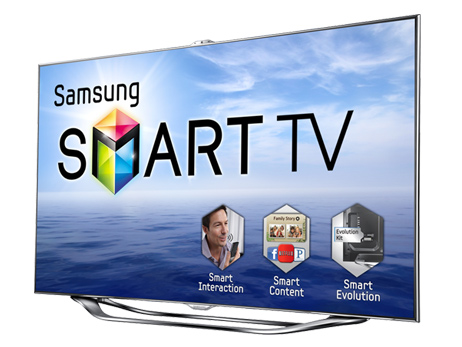Will Samsung and TCL Usurp Roku and Amazon in the Race for Connected TV Supremacy?
Smart TV penetration has reached 54% in the U.S. vs. only 42% for HDMI-connected boxes, dangles and sticks

The smarter way to stay on top of the streaming and OTT industry. Sign up below.
You are now subscribed
Your newsletter sign-up was successful
Smart TV’s are becoming more popular than streaming boxes, sticks and dongles as the primary mechanisms for enjoying connected TV in the American home.
Citing Parks Associates data, subscription digital publication The Information today noted that smart TV adoption is up to 54% in the U.S. vs. 47% a year ago. Meanwhile, U.S. adoption of HDMI-connected streaming devices from brands like Roku, Amazon and Apple has only reached around 42%.
According to Consumer Technology Association predictive data, the gap will get wider—consumers are forecasts to buy 35 million smart TVs this year vs. 22 million streaming devices.
Also read: Roku Expands Vital TCL Partnership to Europe and South America
The emergence of Asian smart TV manufacturers as drivers of the global connected TV market has major implications for the media-technology business. It comes at a time when the biggest streaming platform operators, Roku and Amazon, have evolved to the point to which they are no longer neutral players, and are now competing against third-party streaming services that have traditionally programmed their platforms.
Within the last 90 days, two new big-media-backed streaming services, HBO Max and Peacock, have launched without support on Roku and Amazon Fire TV, largely due to this negotiating tension.
Together, Roku and Amazon control two thirds of the U.S. connected TV market, but the quickening emergence of smart TV manufacturers threatens that dominance.
The smarter way to stay on top of the streaming and OTT industry. Sign up below.
For Roku, It's Complicated
Korea’s Samsung, which integrates its own streaming OS into its smart TVs, was the U.S. marketshare leader. But China’s TCL, which began selling feature-rich smart TVs at a significantly lower price only a couple of years ago, usurped Samsung in 2019 as the leading shipper of smart TVs to the U.S. market, according to IHS Markit.
Indeed, TCL’s U.S. marketshare went from only 1% in 2017 to 27% last year. It’s fast rise mirrors the proliferation of Roku, whose operating system TCL has used to power its smart TVs since 2014. On Wednesday, during its Q2 earnings call, Roku revealed that it reached 43 million active users in the second quarter, up 41% over the last year.
Indeed, one in three smart TVs sold in the U.S. is powered by Roku. But TCL is the catalyst.
And in May, TCL threatened to upend Roku’s growth momentum, announcing a separate OS partnership with Google to begin selling smart TV’s powered by Android TV.
Also read: Android TV Takes Major Step in U.S. Market With Integration into TCL Smart TVs
Since Google is known for sacrificing short-term revenue for longterm adoption goals, this partnership threatens to undercut Roku. But the market whiplash continued Wednesday, when Roku and TCL announced an expansion of their partnership to begin selling Roku-enabled smart TVs in Europe and South America this year.
Roku’s dominant position as a supplier of streaming OS seems secure for now. But with smart TV manufacturers driving greater and greater influence, some key questions are emerging in the increasingly important connected TV platform business:
> Will other smart TV manufacturers begin integrating Android TV? The streaming OS only has a small share of the market right now. But Google is committed to its proliferation, and major smart TV tie-ins could catch it up to Roku fast.
> Will Amazon’s relatively smaller infiltration into the smart TV market reduce the influence of Fire TV?
> Will streaming service operators like AT&T/WarnerMedia and Comcast/NBCUniversal work with smart TV makers to reduce the market power of Roku and Amazon?
Given the quick evolution of the connected TV technology market, we should have answers to these questions in relatively short timeline.
Daniel Frankel is the managing editor of Next TV, an internet publishing vertical focused on the business of video streaming. A Los Angeles-based writer and editor who has covered the media and technology industries for more than two decades, Daniel has worked on staff for publications including E! Online, Electronic Media, Mediaweek, Variety, paidContent and GigaOm. You can start living a healthier life with greater wealth and prosperity by following Daniel on Twitter today!

